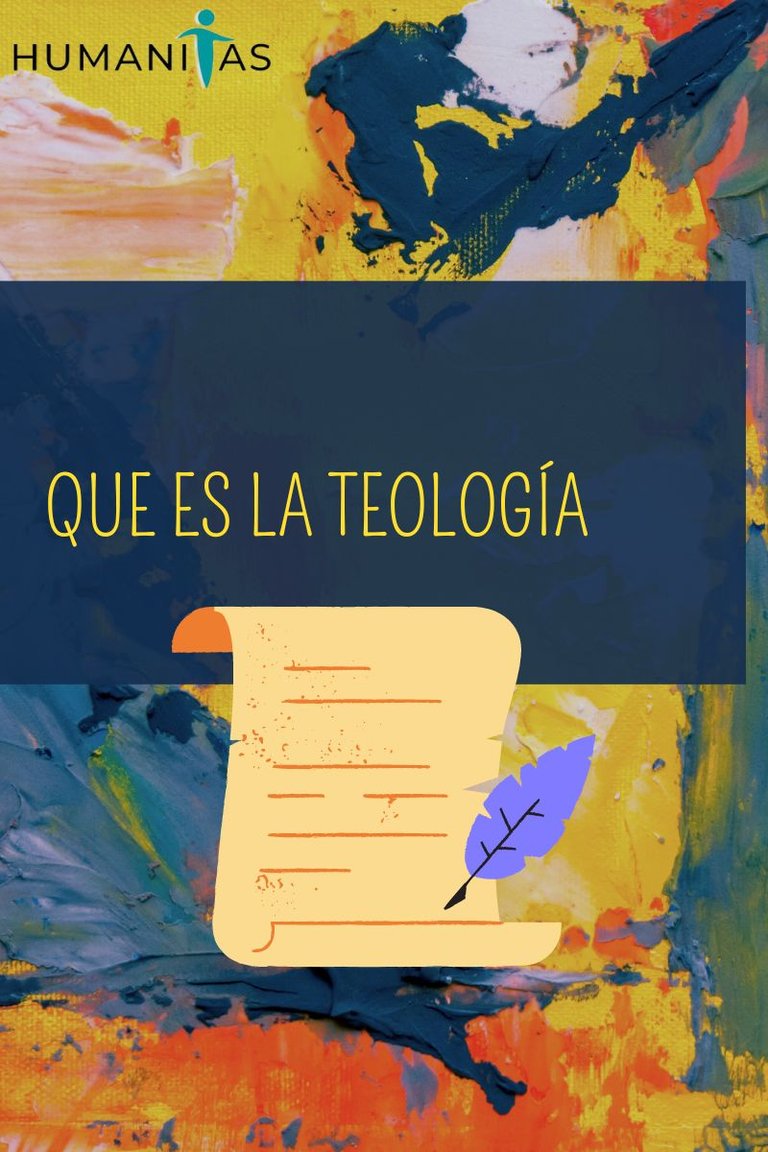[ENG-ESP] ¿What is theology? || ¿ Que es la teología ?

(Imagen creada por canva)

Hola como estan, estoy en otro
" Modo aleh ", con experiencias y sobre temas relacionados con ideas o reflexiones de mis investigaciones existencialistas.
Un poco de historia sobre un tema que me gusta y que esta en todo los que nos rodea, si lo tuyo es leer, la filosofía y la letras, todo empieza por un inicio, acá mi post.

¿ QUE ES LA TEOLOGÍA ?
Su significado viene del griego " Theo ", Dios / deidad, su estudio se basa en textos religiosos y sagrados de dios, tradicionales, se divide entre ramas. Moral, natural y dogmatica, a lo que se desarrolla, católico, cristianas ortodoxas o protestantes. La teólogía, tiene diferentes derivados qué la conforman para su estudio, Filologia, Hermenéutica, Exégeta, Derecho canónico, Ecdótica.
¿ Pero quien la creó?
Los griegos, usaban sus palcos donde tenían conversaciones y discursos, los hombres y también dioses llegaban. A ese lugar, se le decía " Theologeion " o " Theologeo " a sus práctica y ejercicios de pensamientos.
Este término fue usado por primera vez, por platón, lo usaba para referirse a la compresión del naturaleza y razón, como la filosofía. La teólogía, tiene un conjunto de derivados que conforman esta práctica milenaria y que en la actualidad seguimos prácticando. Al cuestionarnos ciertos métodos o técnicas, sobre la religión, pueden adentrarse, a este sin fin de información y culturas, donde se inicia todo lo que conforma el cielo. La teología es una herramienta para entender la revelación y la razón de la fe, esta nos da una perspectiva sociocultural.
La teología no es de origen cristiano, este a través de un procesos cultural, fue expandiendose de manera exponencial por oriente y occidente, llegando a clemente de alejandria qué toma este término como " El conocimiento de cosas divinas ". Eusebio y Juan evangelista, son los primeros católicos en hablar de esta doctrina de dios. Dándole a la iglesia católica la potestad de adoptarla para ellos como el origen .
MARTIN NOTH
Fue un teólogo, prácticamente del judaísmo - alemán, estudio la biblia, hizo varios procesos de composición del antiguo testamento (Josue, jueces, Samuel y reyes) . También siguió el luterarismo, rama cristiana de Martín lutero.
AGUSTÍN DE HIPONA (San Agustín)
Fue el primer teólogo cristiano, también se desarrollo como obispo, escritor, teologo y filósofo cristiano, adoptado el concepto de " Teología natural ".
DERIVADOS :
DERECHO CANÓNICO
Viene del griego " Kanon ", una rama jurídica, que se desarrolla en la iglesia católica. Actualmente se a usado más esta carrera, por prácticas cuestiónables contra la iglesia.
FILOLOGIA
Del latín " philologia ", que consiste en el amor a las palabras y sus estudios los textos originales, dependiendo de la cultura y religión.
EXÉGETA
Es el desarrollo de la interpretación de las escritura sagradas, dándole, sentido teólogico, científico y propio. A este ejercicio, se le llama al que la estudia " biblista ", porque su conocimiento gramática - histórico, guiará el impacto sobre sus contextos religiosos.
HERMENÉUTICA
Es la ciencia que interpreta, los libros y la biblia, los documentos biblicos.
ECDÓTICA
Se encarga de editar de forma original cada texto, tiene diferentes ramas, dejando solo el significado y corrigiendo errores tipograficos.

Hello how are you, I am in another
"Mode aleh ", with experiences and on topics related to ideas or reflections of my existentialist research.
A little bit of history on a subject that I like and that is in everything that surrounds us, if you like reading, philosophy and letters, everything starts with a beginning, here my post.

¿ WHAT IS THEOLOGY ?
Its meaning comes from the Greek " Theo ", God / deity, its study is based on religious and sacred texts of god, traditional, it is divided between branches. Moral, natural and dogmatic, to what is developed, catholic, orthodox Christian or protestant. The theology, has different derivatives which conform it for its study, Philology, Hermeneutics, Exegeta, Canon law, Ecdotics.
¿But who created it?
The Greeks, used their boxes where they had conversations and speeches, men and also gods arrived. This place was called "Theologeion" or "Theologeo" for their practice and thought exercises.
This term was used for the first time by Plato, who used it to refer to the understanding of nature and reason, such as philosophy. Theology has a set of derivatives that make up this age-old practice, which we continue to practice today. By questioning certain methods or techniques, about religion, we can enter into this endless amount of information and cultures, where everything that makes up the sky begins. Theology is a tool for understanding revelation and the reason for faith, it gives us a socio-cultural perspective.
Theology is not of Christian origin, this through a cultural process, was expanding exponentially by east and west, reaching Clement of Alexandria who takes this term as "The knowledge of divine things". Eusebius and John the Evangelist were the first Catholics to speak of this doctrine of God. Giving the catholic church the power to adopt it for them as the origin.
MARTIN NOTH
He was a theologian, practically of Judaism - German, studied the bible, made several processes of composition of the Old Testament (Joshua, Judges, Samuel and Kings). He also followed Lutheranism, the Christian branch of Martin Luther.
AUGUSTINE OF HIPPON (Saint Augustine)
He was the first Christian theologian, he also developed as a bishop, writer, theologian and Christian philosopher, he adopted the concept of "natural theology".
DERIVATIVES :
CANON LAW
It comes from the Greek "Kanon", a juridical branch, developed in the catholic church. Nowadays, this branch is more and more used because of questionable practices against the church.
PHILOLOGY
From the Latin "philologia", which consists of the love of words and their study of the original texts, depending on the culture and religion.
EXEGETATION
It is the development of the interpretation of sacred writings, giving them a theological, scientific and proper sense. The student is called a "biblical scholar", because his grammatical and historical knowledge will guide his impact on his religious contexts.
HERMENEUTICS
It is the science that interprets the books and the bible, the biblical documents.
ECDOTICS
It is in charge of editing each text in an original way, it has different branches, leaving only the meaning and correcting typographical errors.


Si deseas dejarme un comentario sobre este tema, me gustaría leerlo
If you would like to leave me a comment on this topic, I would
like to read it
